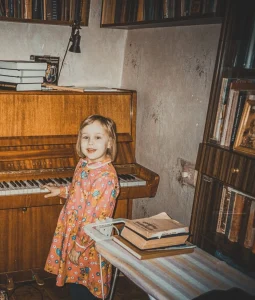Probably, all the parents around the world have heard that their piano-playing children “should practice at home.”
However, many parents may not fully understand what home practice means or how it should be conducted. It’s not surprising, as not all parents have had formal piano education themselves, and the feelings of perplexity that parents might experience about this are not something to be ashamed of.
This is why I, a classical pianist and certified piano pedagogue, have decided to start writing monthly newsletters for the parents of my wonderful students to provide them with support they deserve and to shed new light for fellow piano pedagogues and music educators on their teaching path.
Here someone might ask, do I not instruct my students clearly enough about their homework, if they cannot do it without parental input.
Of course, I fill in the weekly homework notes for my students.
Of course, I assign only lesson material to be practiced at home.
And still (!), without parental support and conscious comprehension about their role in their child´s piano home learning, the homework practicing of young children does not often reach its potential progress, therefore success. Read that again.
In this letter, I will explain to you why:
because of many false presuppositions and common misconceptions that we will debunk now here, together. I have gathered the most frequently asked questions about home practice from my parents and will happily answer them here, one by one.
So, grab your coffee, read on, and do not forget to subscribe to receive future parent newsletters!
NO (surprise!).
If your young pianist is just starting their piano journey, most likely they will have six days in between of piano lessons where they are guided by their teacher. In order to create a connection between piano lessons and home practicing, your young musician will have to
-
MEMORY RECALL:
Your young pianist needs to remember what they learned during the lesson. This can be challenging, as even adults often struggle to retain new skills or knowledge immediately after learning them.
-
INTERPRETE HOMEWORK NOTES:
Young musician must be able to interpret the homework notes written by their teacher, which requires good deciphering skills and understanding of the teacher’s instructions.
-
READ AND OPEN (!) HOMEWORK NOTEBOOK:
Developing the discipline and self-regulation to remember to open and read the homework notebook can be difficult for young children. Why? Because it might be the first time ever they encounter this type of regular work discipline, if they are preschool aged.
-
BASIC LITERACY SKILLS:
Your child needs to have a foundational ability to read in order to understand their assignments. How many preschooler can do this? Even to tell apart the written “DO” and “RE”, not to mention playing those do and re, because they were not able to read it in the first place?
The list is astonishing, isn´t it? And even as adults, with all these skills, to put this package together demands conscious and pro-active attitude and mindset, that cannot be asked from a 4-years old child.
This is why this list already guides you, dear parent, towards your very precise role in your young pianist´s home practicing.
To come together with your child to the instrument, to meet piano together; to open the homework notebook together, and to read aloud and clearly the instructions their teacher has left for the six days of home practice. And to do this every single practice day:
to support your child in all the above mentioned points of the list.
Namely, to support your child in the skills that they did not develop (nor are supposed to develop at this phase) yet due to their very young age.
Your role is in helping your young pianist to start their daily practicing routine.

